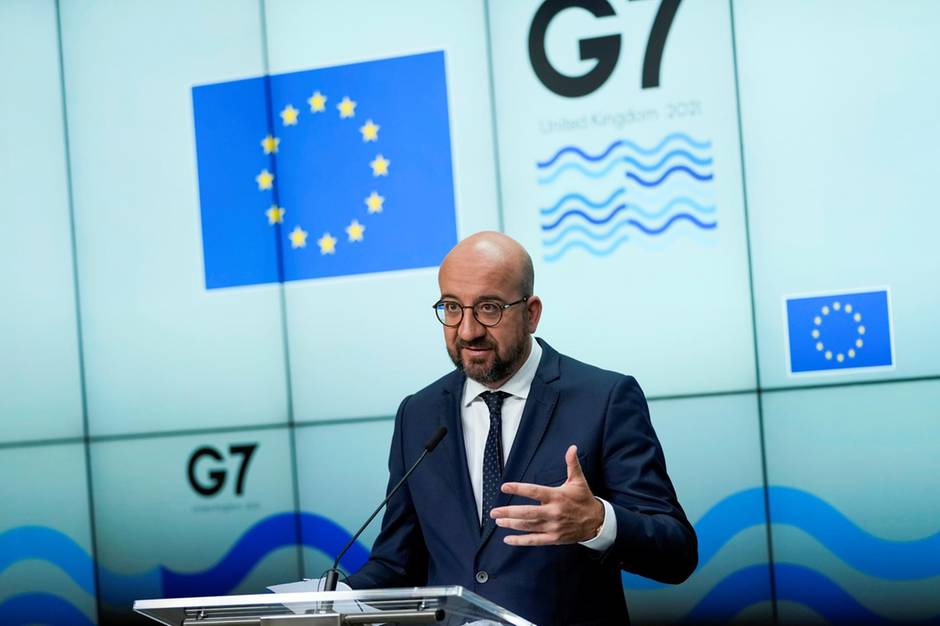G7 LEADERS are poised to pledge one billion vaccines to the world in an effort to overcome the coronavirus pandemic by the end of 2022.
A leaked communique suggests they will use this weekend’s summit in Britain to call for a new study into the origins of the virus.
World leaders are under pressure to redress an imbalance in global vaccine supplies condemned by human rights groups and the World Health Organisation.
The US said it would buy 500 million Pfizer-BioNTech doses to be distributed among 92 poorer countries by the middle of 2022.
European leaders will join a G7 pledge to deliver one billion vaccines by the end of next year, according to the draft communique seen by Bloomberg.
But a divided Europe was under pressure to go farther by agreeing to a waiver of intellectual property rights on vaccines.
The proposal gathered momentum after the European Parliament voted to support it and the World Trade Organisation moved forward with talks on a waiver.
The G7 is expected to discuss the plan at this weekend’s summit, with leaders divided over the idea.
The US and France support a waiver, but Germany is opposed, while Britain backs an EU counterproposal to grant vaccine licences to manufacturers.
G7 guests India and South Africa are key backers of a waiver, and South African President Cyril Ramaphosa said he would try to rally support at the summit.
Before the summit, MEPs called on Brussels to back a temporary waiver in a 355-263 vote in Strasbourg.
But European Council President Charles Michel said in Brussels that the EU was focusing its efforts on donating doses and investing in manufacturing.
“The question of intellectual property rights will likely be raised in this context” at the G7, he said. “A patent waiver might sound good but it’s no silver bullet.”
Mr Michel said the EU supported efforts to launch a full investigation into the origins of Covid-19, which are still unclear.
US President Joe Biden said last month that US intelligence agencies were pursuing several theories, including the possibility of a lab accident in China.
“The world has the right to know exactly what happened in order to be able to learn the lessons,” Mr Michel said.
G7 leaders will call for a new, transparent WHO-convened study into the origins of the virus, the leaked draft said.
Washington plays down contention
Despite Washington’s support for the proposal, the White House played down the prospect of Mr Biden prioritising the matter at the G7 meeting.
“I don’t anticipate contention on the issue of vaccines,” Mr Biden’s national security adviser Jake Sullivan said.
White House press secretary Jen Psaki said negotiations on a waiver would be left to senior US trade representative Katherine Tai.
“It’s a long process, as you know – several months to negotiate what the best format will look like,” she said. “But I would suspect we will leave it at the level of the US ambassador.”
Asked whether Mr Biden would put his political weight behind the issue, Ms Psaki said: “He will continue to play a constructive role.”
French President Emmanuel Macron said on Wednesday his country was in favour of an “opening up of intellectual property”.
Cecile Duflot, the head of Oxfam France, said after meeting Mr Macron that the president had committed to the waiver in a meeting with NGOs.
UK Prime Minister Boris Johnson said Britain hopes to raise the issue of one billion vaccines at the G7 summit.
‘Major breakthrough’
WTO members agreed on Wednesday to begin formal negotiations on two rival proposals on vaccine rights.
One of these is the waiver backed by many developing countries who say it is needed to address the global inequality in supply.
Some wealthy nations say that a waiver could undermine future research and development on vaccines.
The EU’s counter-proposal, backed by Britain and Switzerland, says existing WTO rules already allow countries to grant licences to manufacturers.
WTO members agreed to begin preliminary discussions on June 17 and report back on their progress by the time of a general council meeting in July.
“This is a major breakthrough after eight months of stalling,” said Leena Menghany of medical aid group Doctors Without Borders.
- The National News



